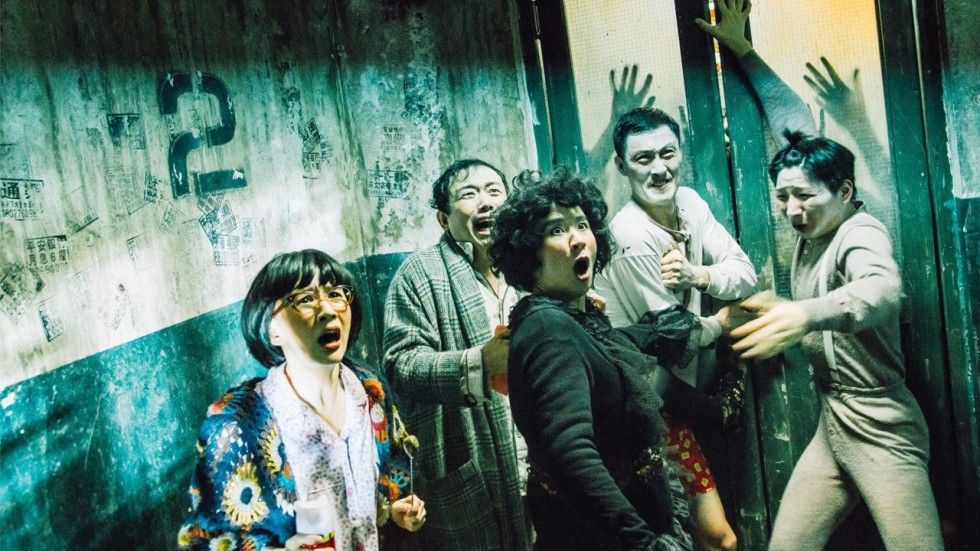Goldbuster (Sandra Ng, 2017)

In her directorial debut, veteran comic actress Sandra Ng gives us a goofy farce, a compendium of horror movie tropes and references, and a sappy tribute to the underdog spirit of Hong Kong’s working class in the days of hyper-capitalism and real estate speculation. She plays a ghostbuster hired by a handful of families to protect themselves from the evil spirits haunting their dilapidated apartment building. The ghosts are a scam, a scheme by a developer to get the last remaining tenants of the property to sell so he can tear the building down and make something new (the pull-away shot revealing the location is striking: a lone run-down concrete block surrounded by a massive ditch separating it from the city itself, all CGI skyscrapers and hazy lights, an island of the real in the middle of an urban fantasy). Ng, no stranger to con games herself, quickly deduces the scam and helps the residents out-scare their ghosts, a game of horror movie one-upsmanship that turns into a full-scale zombie invasion.
Ng has been one of Hong Kong’s brightest comics for over two decades now, equally at home in slapstick, grotesquerie, and wordplay, and while her film doesn’t have the classical misanthropy of Michael Hui or the blinding verbal games of Stephen Chow, it does recall her own Golden Chicken films in the way it explores how the feeling and ideology of a place can be expressed through the stories it tells itself. In Golden Chicken and its sequel (from 2002 and 2003), she plays a gregarious prostitute who recalls her life story in parallel to the history of Hong Kong, political and pop cultural, from the late 70s through the immediate post-Handover era. Goldbuster isn’t as expansive, but rather explores how stories of the supernatural can paralyze us and how fear is manipulated by ruling elites to bend us to their whim, Scooby-Doo as Marxist allegory.
While, pointedly, Goldbuster‘s location is never specified, it could technically take place in any Chinese city, that seems more a concession of vagueness for the Mainland market than any real conviction. In tone and purpose this is a resolutely Hong Kong film, where stories about housing complexes and tenants’ wars with their landlords have a long tradition, a byproduct of the housing shortages which followed the influx of massive numbers of refugees in the post-World War II and Civil War years. Chor Yuen’s House of 72 Tenants almost single-handedly saved the Cantonese language film from extinction in the early 70s, and in recent years as speculation and real estate bubbles have made affordable housing increasingly hard to find, the subject has become ubiquitous. Comedies like Temporary Family, which played here at SIFF in 2015, and last year’s Sinking City: Capsule Odyssey address it head-on, while Goldbuster folds the crisis into the fabric of its gonzo vision of a city driven to apocalypse by decades of unease and overdevelopment.
Each of its characters, generic types all of course, are refugees in some way from the past twenty years of economics and pop culture: scientists scammed out of their patents; a cam girl; over-the-hill Triads, one of whom (the great Francis Ng (no relation) thinks he’s a cop); a doctor who failed to save his wife from some illness. The latter is the most melodramatic character, afflicted as he is by an adorable son and a penchant for whininess, obsessed with finding his wife’s ghost and somehow atoning for her death. This is the paralytic state the tenants find themselves in: trapped by fear and overcome with superstition, surrounded on all sides by rapacious capital. Only with the wit and heart of a scoundrel like Sandra Ng can they hope to defeat the forces waged against them. Another victory for the indigenous scrappiness of Hong Kongers against the powers of vague superstition and vampiric elites.
